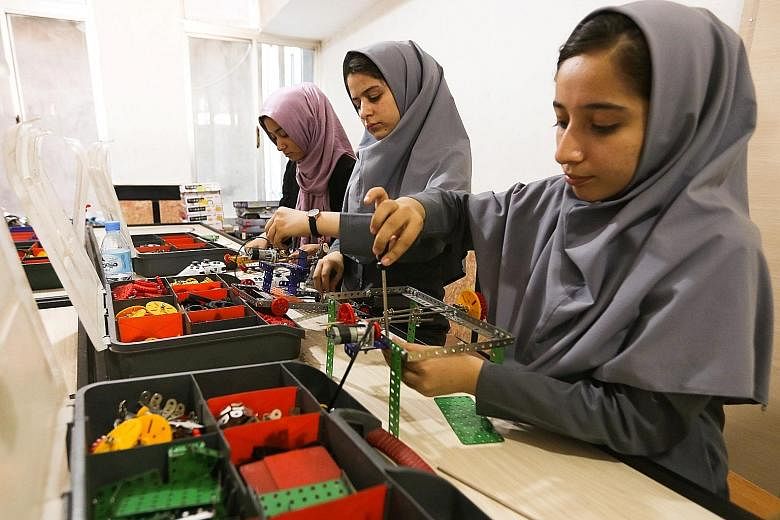KABUL • When six Afghan teenage girls were denied visas to the United States to take part in a robotics contest in Washington scheduled for later this month, the unexplained decision seemed to be punishing the very ambitions US agencies have long advocated for girls in Afghanistan, where many are denied educational opportunities.
But the story is more complicated than that.
Afghanistan, beset by insurgent violence and economic uncertainty, is suffering from a massive brain drain, according to Afghan and US officials.
Scholarship students, academic fellows and teachers who receive temporary visas to visit the US often vanish into immigrant communities instead of returning home.
The growing phenomenon has made US officials especially wary of approving visa requests - even for applicants such as the robotics students who may otherwise deserve them - if they decide there is a risk the person will not return home.
"It is sad to say, but some of them do not come back," said Mr Elham Shaheen, a senior official at the Ministry of Higher Education who manages foreign-study policies.
He said that 10 per cent of all Afghans who are awarded temporary visas for academic purposes in the US or Europe defy immigration rules to remain there permanently. Female students and faculty members, facing extra frustrations at home, are no exception.
Several years ago, Mr Shaheen said, 12 female university lecturers won scholarships to obtain master's degrees in economics in Germany. Of the 12, he said, "11 of them escaped".
US officials in Kabul and Washington have refused to discuss the robotics team's case, but several pointed out that US law "presumes" all temporary visa seekers intend to remain in the US unless they are able to prove they have compellingly strong ties to their country.
Two members of the team, interviewed last Thursday in their home city of Herat, said US consular officers had asked about their ties to Afghanistan, whether they had relatives in the US and whether they intended to return home after the competition.
Youth teams from about 150 countries will face off next week in the First Global Challenge contest, created to promote international student interest in science, technology and mathematics.
Only one other team, from Gambia, was turned down.
"Each of us gave them written guarantees from two government employees vouching for our return," said Rodaba Noori, 16, a member of the Afghan team that built a ball-sorting robot.
"This is our country. We have our life and family here. How could we abandon them and not return after the competition?"
Obtaining a visa, though, is just the last of many daunting hurdles the female students face in their efforts to advance academically - long before they can even dream of travelling abroad.
Afghan families often oppose their daughters attending universities in Kabul or other cities, fearing for their safety and exposure to young men. Girls are also at a disadvantage in English and mathematics because Afghan families are more willing to pay for boys to take private classes. As a result, more girls fail college-entrance exams.
Despite her disappointment at being turned down to visit the US, where the robot will now appear at the competition without its creators, Yasamin Yasinzada, 16, said she still hopes to study abroad.
"The specific place doesn't matter," she added.
"I just want to learn, interact, see other ways of life, come back home and put it all into practice."
WASHINGTON POST

